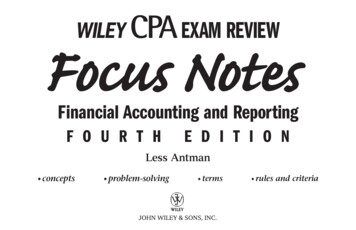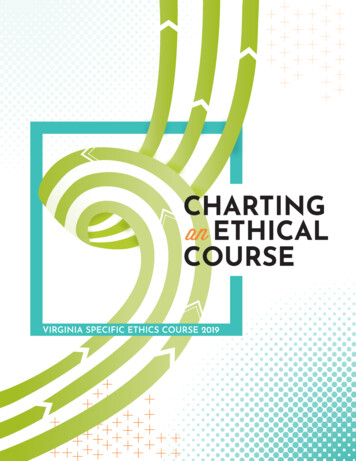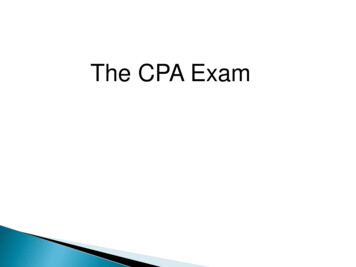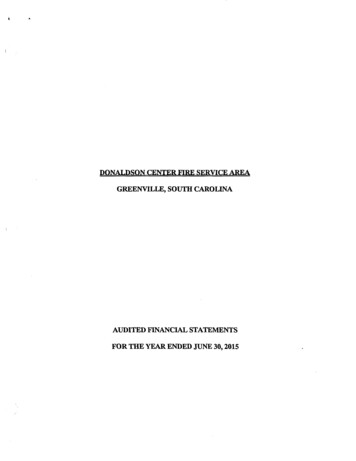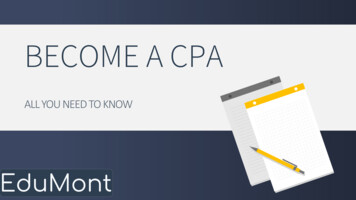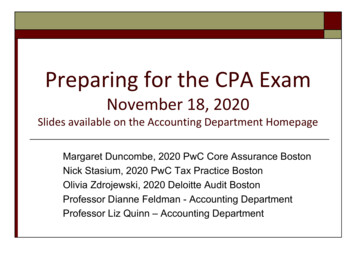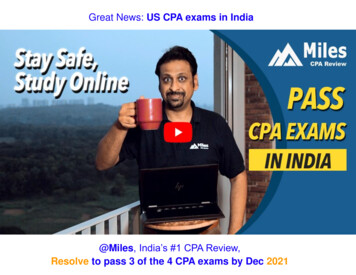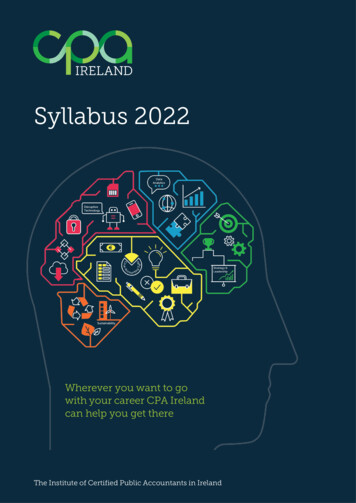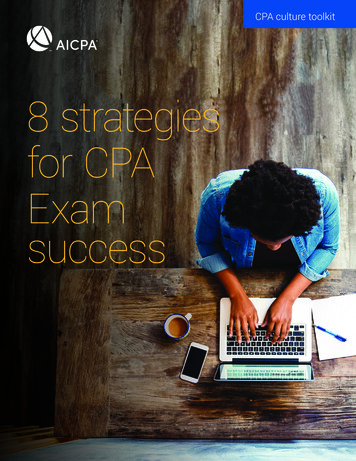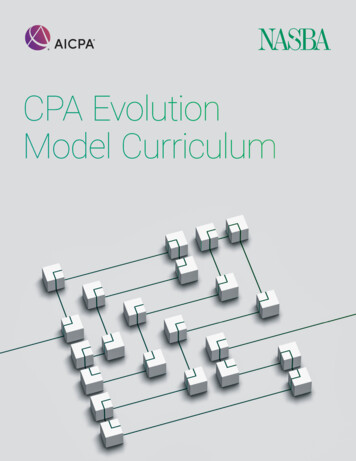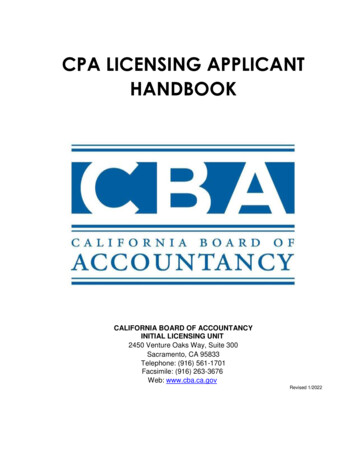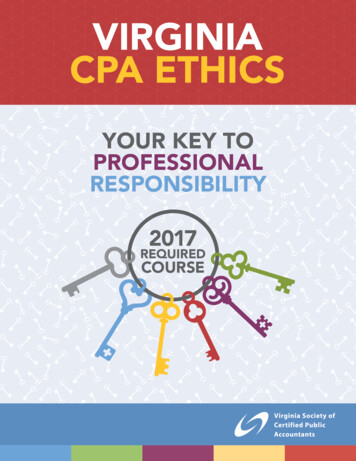
Transcription
VIRGINIACPA ETHICSYOUR KEY TOPROFESSIONALRESPONSIBILITY2017REQUIREDCOURSE
Virginia CPA Ethics:2017 Required CourseCPE presentation developed by:Virginia Society of CPAs (VSCPA)Jim Cole, CPAClare Levison, CPAJim Shepherd, CPAEdited by:Larry Hurt, CPALauren Johns, CPAMatthew Miller, CPALaura Seal, CPAThis training has been created to help you meet the Virginia Board of Accountancy’s (VBOA) annual 2-hour (100-minute) CPErequirement for 2017. In 2003, the Virginia General Assembly passed a law requiring all CPAs subject to Virginia CPE requirements totake an annual Ethics CPE course. Each year, the VBOA provides an outline of topics to be included, which can be found attinyurl.com/2017VBOAEthicsOutline (DOCX). Developed using that outline as the course framework, attendees will be able toaccomplish the following fundamental objectives:Identify the core ethical responsibilities a CPA has to the public and to his or her clients/employerDifferentiate between acceptable and non-acceptable behavior for Virginia CPAs as outlined in the American Institute of CPAs(AICPA) Code of Conduct, Virginia statutes and regulations and other resourceszzRecall Virginia CPE rules and consequenceszzRecognize the impact of unlicensed activity to individuals and firmszzzzThe VBOA has confirmed that this class qualifies for 2 hours (100 minutes) of Ethics CPE in Virginia as well as 2 hours of Ethics CPEfor CPAs licensed in these other states:Maryland: Satisfies 2 hourszzNorth Carolina: Group study and self-study versions satisfy 2 hours for CPAs licensed in Virginia and North Carolina for CPAswho primarily work in VirginiazzWashington, D.C.: Satisfies 2 hourszzWest Virginia: Satisfies 2 hourszzThis course may also qualify for similar continuing education credit in other jurisdictions and fulfill Ethics requirements for particularspecialized certifications. Attendees are encouraged to consult applicable regulations or regulatory bodies for additional information.Please note: This class is not intended to be an all-encompassing update or to present all significant events occurring during the prioryear. The information provided and scenarios presented do not represent official positions of the VBOA, the AICPA, the U.S. InternalRevenue Service (IRS), the International Ethics Standards Board for Accountants (IESBA) or any other standard-setting or regulatorybody discussed herein, nor do they represent the views of any individual course instructor unless specifically noted. For specific adviceor clarification, please research the applicable standards or seek advice from the appropriate governing/regulating organization.Copyright 2017 Virginia Society of Certified Public Accountants. All Rights Reserved.
Table of ContentsVirginia-Specific Ethics Course 2017 Outline . . . . . . . . . . . . . . . . . . . . . . . . . . . . . . . . . . . . . . . . . . . . . . . . . . . . . . . . . . . . . . 3Knowledge Check . . . . . . . . . . . . . . . . . . . . . . . . . . . . . . . . . . . . . . . . . . . . . . . . . . . . . . . . . . . . . . . . . . . . . . . . . . . . . . . . . . . 4Chapter I: Professional Conduct. . . . . . . . . . . . . . . . . . . . . . . . . . . . . . . . . . . . . . . . . . . . . . . . . . . . . . . . . . . . . . . . . . . . . . . . 5Conflicts of Interest. . . . . . . . . . . . . . . . . . . . . . . . . . . . . . . . . . . . . . . . . . . . . . . . . . . . . . . . . . . . . . . . . . . . . . . . . 6Negligence. . . . . . . . . . . . . . . . . . . . . . . . . . . . . . . . . . . . . . . . . . . . . . . . . . . . . . . . . . . . . . . . . . . . . . . . . . . . . . . 11Gifts and Entertainment . . . . . . . . . . . . . . . . . . . . . . . . . . . . . . . . . . . . . . . . . . . . . . . . . . . . . . . . . . . . . . . . . . . . 11Confidentiality and Data Security. . . . . . . . . . . . . . . . . . . . . . . . . . . . . . . . . . . . . . . . . . . . . . . . . . . . . . . . . . . . . 14Client Records . . . . . . . . . . . . . . . . . . . . . . . . . . . . . . . . . . . . . . . . . . . . . . . . . . . . . . . . . . . . . . . . . . . . . . . . . . . . 19New and Revised Interpretations and Other Guidance. . . . . . . . . . . . . . . . . . . . . . . . . . . . . . . . . . . . . . . . . . . . 21Cybercrime. . . . . . . . . . . . . . . . . . . . . . . . . . . . . . . . . . . . . . . . . . . . . . . . . . . . . . . . . . . . . . . . . . . . . . . . . . . . . . . 22Integrity and Independence . . . . . . . . . . . . . . . . . . . . . . . . . . . . . . . . . . . . . . . . . . . . . . . . . . . . . . . . . . . . . . . . . 27Financial Statement Preparation Services. . . . . . . . . . . . . . . . . . . . . . . . . . . . . . . . . . . . . . . . . . . . . . . . . . . . . . . 34Chapter II: VBOA Enforcement. . . . . . . . . . . . . . . . . . . . . . . . . . . . . . . . . . . . . . . . . . . . . . . . . . . . . . . . . . . . . . . . . . . . . . . . 35License Renewal. . . . . . . . . . . . . . . . . . . . . . . . . . . . . . . . . . . . . . . . . . . . . . . . . . . . . . . . . . . . . . . . . . . . . . . . . . . 35CPE. . . . . . . . . . . . . . . . . . . . . . . . . . . . . . . . . . . . . . . . . . . . . . . . . . . . . . . . . . . . . . . . . . . . . . . . . . . . . . . . . . . . . 36Other Enforcement Cases. . . . . . . . . . . . . . . . . . . . . . . . . . . . . . . . . . . . . . . . . . . . . . . . . . . . . . . . . . . . . . . . . . . 43Volunteer Services. . . . . . . . . . . . . . . . . . . . . . . . . . . . . . . . . . . . . . . . . . . . . . . . . . . . . . . . . . . . . . . . . . . . . . . . . 44Enforcement Cases Chart. . . . . . . . . . . . . . . . . . . . . . . . . . . . . . . . . . . . . . . . . . . . . . . . . . . . . . . . . . . . . . . . . . . 46Conclusion . . . . . . . . . . . . . . . . . . . . . . . . . . . . . . . . . . . . . . . . . . . . . . . . . . . . . . . . . . . . . . . . . . . . . . . . . . . . . . . . . . . . . . . . 47Appendix I: Resources, Glossary and Acronyms. . . . . . . . . . . . . . . . . . . . . . . . . . . . . . . . . . . . . . . . . . . . . . . . . . . . . . . . . . . 48Appendix II: Video Scripts. . . . . . . . . . . . . . . . . . . . . . . . . . . . . . . . . . . . . . . . . . . . . . . . . . . . . . . . . . . . . . . . . . . . . . . . . . . . 52Appendix III: Presentation. . . . . . . . . . . . . . . . . . . . . . . . . . . . . . . . . . . . . . . . . . . . . . . . . . . . . . . . . . . . . . . . . . . . . . . . . . . . 55Copyright 2017 Virginia Society of Certified Public Accountants. All Rights Reserved.
Virginia-Specific Ethics Course 2017 OutlineA. Introductory VideoB. Ethics — Code of ConductThis section is to cover the “core” responsibilities the CPA has to their clients/employer, emphasizing how thisapplies to both CPAs in public accounting and non-public (industry, government & academia). This section shouldbe a high level summary of these core items, with more detail provided on the topics of independence & non-attestservices, and data security. Recent changes to the code of conduct should also be highlighted. Course should alsomention the CPAs ethical responsibility when certifying their annual renewal (i.e., CPE compliant). All discussiontopics throughout the course will include resources for obtaining additional information.zz Integrity & objectivity (independence)zz Gifts and the use of third-party service providerszz Conflicts of interestzz Confidentiality (data security)zz Negligence (how it relates to industry)zz Client records (public)C. Overview of Board’s Enforcement Caseszz Table of categories/percentageszz Include the range of penalties imposed1. CPEzz Going to/from “Active-CPE Exempt” Status and “Active” Statuszz CPE deficiencies (enforcement case examples provided)zz What qualifies as CPE (including new standard changes, i.e., Nano learning)zz Use of the CPE Tracking System2. Unlicensed Activity (enforcement case examples provided)Note: Emphasize the potential impact/relationship to individuals and firms.zzzzzzUse of the CPA TitleProviding services limited to CPAsVolunteer work (Note: no enforcement case examples; however, course should provide an overview of what is/is not acceptable to avoid unlicensed activity, to include a link to the VBOA’s Volunteer Services guidebook).3. Other Enforcement Case Exampleszz Tax relatedzz Audit relatedFor Virginia-Specific Ethics Course Providers/InstructorsNote: Providers/instructors must provide a copy of this outline to each participant. It is recommended that providers/instructors make cases andother materials available to participants in advance, e.g., by posting them on provider websites.Important: Virginia-Specific Ethics Course providers/instructors should encourage participants to monitor the VBOA website for updates andinformation regarding the VBOA. Providers/instructors should also recommend that licensees register with the Virginia Town Hall to receiveautomated VBOA regulatory updates (townhall.virginia.gov).Copyright 2017 Virginia Society of Certified Public Accountants. All Rights Reserved.
Knowledge Check1. List the core ethical responsibilities a CPA has to the public and to his or her clients/employer:2. According to the AICPA Code of Professional Conduct, what is considered acceptable versus nonacceptable behavior? According to the Virginia statutes? Virginia regulations?3. List the VBOA’s CPE rules and consequences:4. Describe the impact of unlicensed activity:Copyright 2017 Virginia Society of Certified Public Accountants. All Rights Reserved.
Chapter I: Professional ConductINSTRUCTOR NOTE: Be mindful of timing as you go through thecourse and skim or skip some slides to help with time. Create your owntiming benchmarks in presenting the course — the Train the Trainervideo can help with this. Be aware of the makeup of your class (publicvs. business/industry) and be cognizant of the terminology of you use.The CPA credential implies objectivity, integrity and soundprofessional judgment. The public has the expectationthat this is what they will be getting when working withCPAs. Along with that expectation come laws, codes, rules,regulations, and policies enacted to motivate proper behaviorand punish improper behavior on the part of CPAs.One of the hallmarks of any “profession” is that members of theprofession are required to conform to a standard of conduct.The CPA profession has documented standards of conductat both the state and national level. At our foundation, weare a profession guided by these standards and compliancewith them is our minimum bar for ethical behavior.INSTRUCTOR NOTE: You ca
Virginia CPA Ethics: 2017 Required Course CPE presentation developed by: Edited by: . requirement for 2017. In 2003, the Virginia General Assembly passed a law requiring all CPAs subject to Virginia CPE requirements to take an annual Ethics CPE course. Each year, the VBOA provides an outline of topics to be included, which can be found at .
